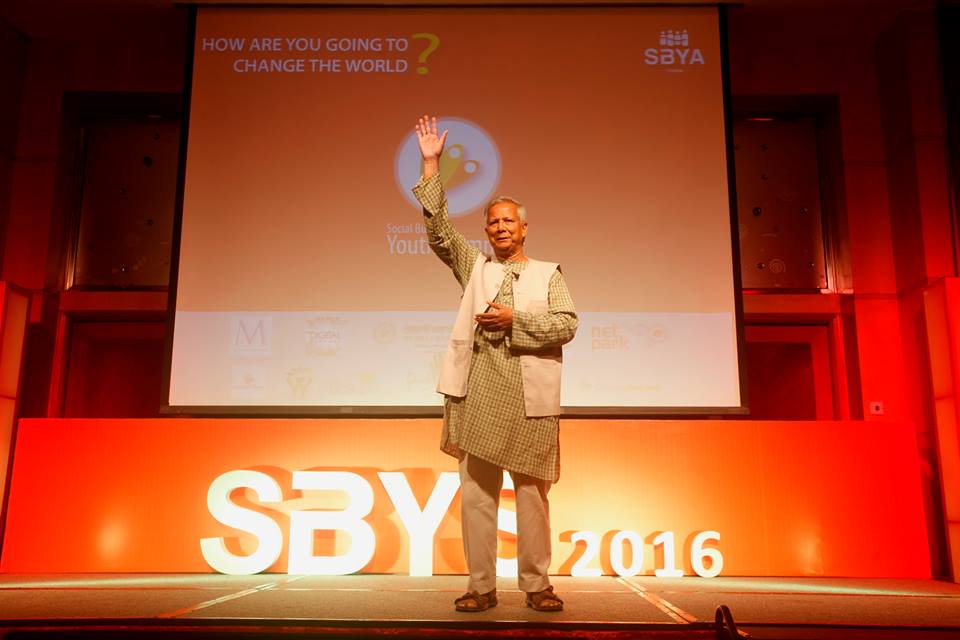
After two days of brilliant talks, thought-provoking panels, mind-blowing conversations, and hyper-networking a few common themes have emerged. Social business is not what you think it is.
With the slogan “Listen. Learn. Lead.” the Social Business Youth Summit 2016 successfully ended on 13th of August. During the two days long leading youth forum in the country, around 350 participants gathered at The Westin, Dhaka to learn from and network with entrepreneurs, experts, thought leaders, and passionate followers in the field of social business in Bangladesh.
The event was packed with lessons and experiences from people who are actively contributing to the society and was a perfect weekend retreat for anyone looking for food for thought in the area of doing well by doing good.
Making money is happiness, but making other people happy is super-happiness. The motive behind a social business is stronger than the motive behind a for-profit one.- Professor Muhammad Yunus
In Social business, impact and sustainability come before profit.
Unlike for-profit businesses, the primary objective of social business is to provide a solution to a problem that change lives. It is not that a social business can’t make a profit or earn money, it can but owners can’t take a dividend from the business once they recover their investment. Social entrepreneurs seek sustenance, not profitability.
By nature, social business calls for greater effort. While a conventional business only focuses on maximizing profit, a social business gets to make a profit in order to survive and to maximize its impact. It requires further effort to scale impact and profit at the same time.
As Professor Muhammad Yunus puts it: Social business is somewhat like a demilitarized zone. Nobody carries a gun here like they do in the profit-making areas. We are all friends here and we don’t want to eliminate anybody. We want to work together.
Underrepresentation of women in business is a serious problem.
The rate of participation of women in businesses and professional areas is not increasing at a hopeful, opined most of the speakers. They pointed out that woman is a major driving force behind the economy of this country, but they are still lagging behind in terms of involvement and performance in business.
MK Aaref, Director, EMK Center, shared his experience in incorporating women through various competitive programs and how they fell out at the initial stage.
Two other speakers Nawshin Khair, Director of Bengal Group, and Nurjahan Begum, Managing Director of Grameen Shakti, also expressed their concerns about the challenges women have to face in the workplace. In her speech, Nurjahan Begum described what hardship she had to endure from her family and community when she started her career in Grameen Bank in the early nineties.
What I see from my experience over the last year is that there is a tremendous opportunity in the southwest of Bangladesh for the agricultural sector to become the next export-centric business hub of Bangladesh.- Boudewijn Sterk, Manager, Innovation Fund, Blue Gold
Agriculture offers abundant opportunities for young people. The sector is an old gold.
Despite being a long-standing propulsive force behind the economy, agriculture has been a generally overlooked sector in our country. It is still very traditional in its nature. A little to none initiative has been taken to integrate technology with agriculture in Bangladesh. But, this sector has enormous possibilities in its store, as was observed by Boudewijn Sterk.
He has been working in managing water resources, and promoting and intensifying agricultural initiatives in Khulna, Patuakhali, and Satkhira. His experiences tell him that agricultural export is going to increase dramatically in the southwestern region given that transportation system is improving between Calcutta and Dhaka.He concluded by urging young entrepreneurs to come forward and contribute to agriculture.
There is a growing startup culture in Bangladesh–social and otherwise. But the problem is that every activity is Dhaka-based. We need to find out the root cause of this problem and decentralize. -MK Aaref, Director, EMK Center
Dhaka is not Bangladesh. And we need to get out of Dhaka.
It is easily discernible that every “in-thing” in Bangladesh starts, spread and then dies in Dhaka. Over the decades, centralization has become a major drawback for our economy and business. The trend is, as MK Aaref pointed out, as if all roads lead to Dhaka. But Dhaka is only a small portion of the entire country. In order to achieve overall national development, we must spread out of Dhaka and decentralize our activities.
[blockquote source="Muhammad Anamul Haque Bijoy, Wicket-keeper, Bangladesh National Cricket Team"]“When I retire as a professional sportsman, I would like to build a sports training center to patronize and groom promising young cricketers. I do not have much academic knowledge about business but my heart tells me that it is very much a social business. I will feel very happy to do it. [/blockquote]
Sport inspires us and helps us to build a better inclusive society.
In his keynote speech, Professor Muhammad Yunus emphasized the importance of sports in promoting peace and social cause. Three sportsmen, including national football player Jahid Hasan Ameli and national cricketer Anamul Haque Bijoy, were also invited to the summit to discuss how sports can contribute to the social business. They shared how they plan to serve the community in the future.
Social Business Youth Summit, a two-day long conference, is an annual event by SBYA Global. This year’s conference, a combination of keynotes, talks, panels, mind-blowing conversations, and networking took place at The Westin, Dhaka.
